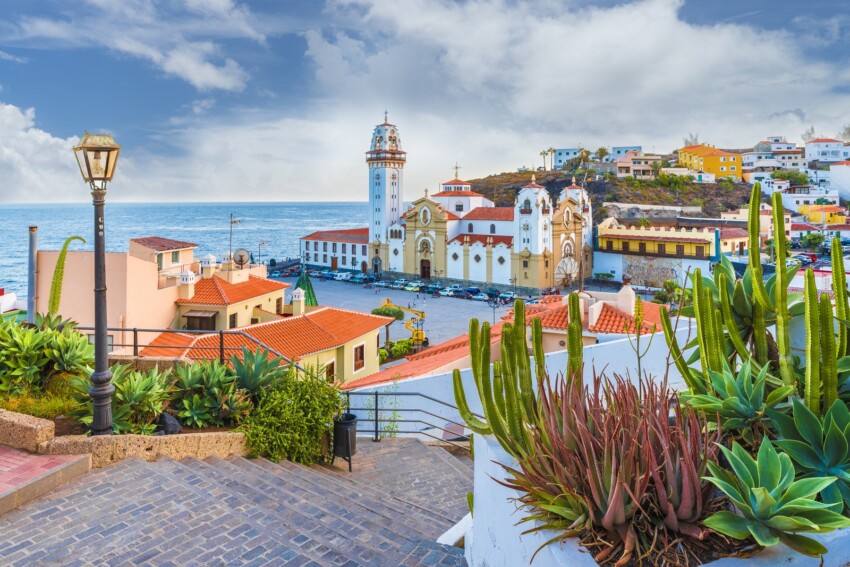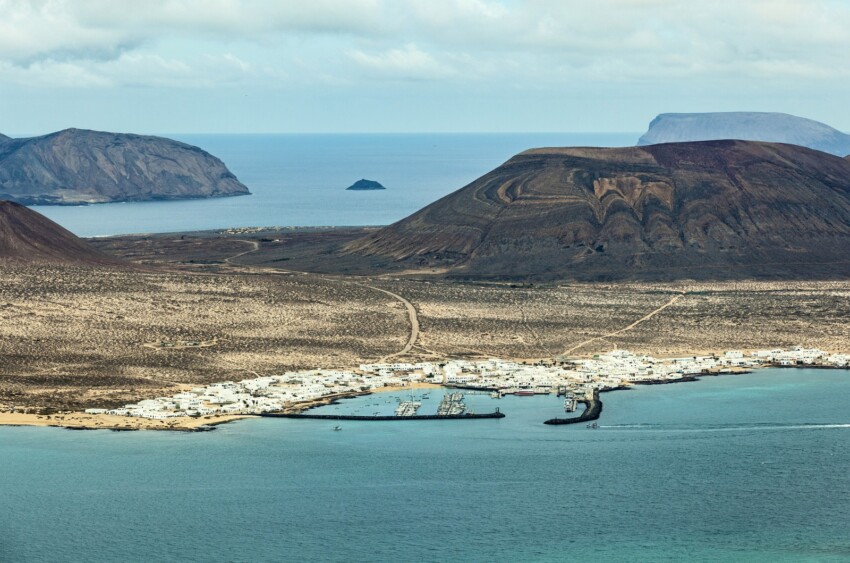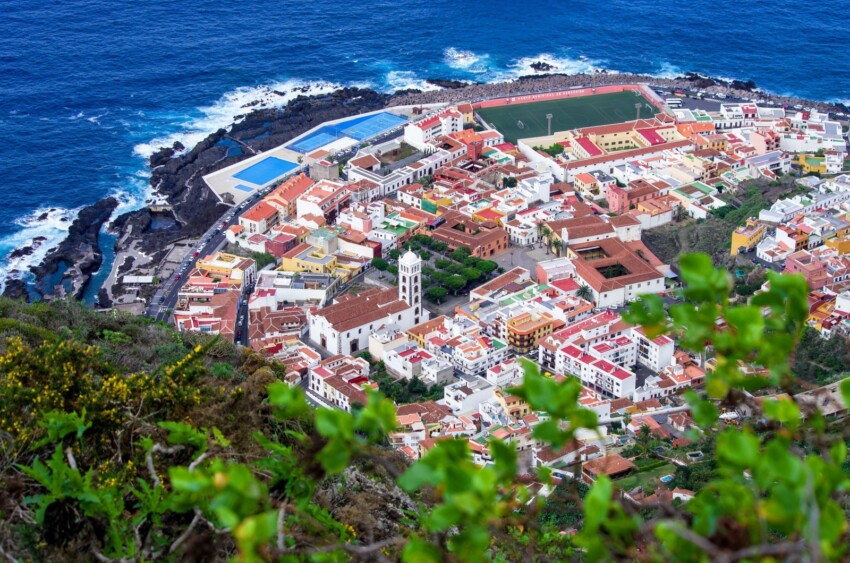

Living in the Canaries is a dream for many: crystal-clear sea, a fantastic climate all year round, endless sunshine and low prices.
You don’t need much else to enjoy life, so here is a simple guide to taking the plunge and starting a new life in this magnificent archipelago.
Thanks to the fact that they are part of the European Union as they are politically part of Spain, moving to the Canaries is easy: EU citizens have the right to live and work, and obtaining a residence permit is simple.
It is also possible to rely on a gestor, i.e. an intermediary or practice agency that takes care of the internal bureaucracy to provide you with all the necessary documents in the shortest possible time.
Finally, once you are there, it is not enough to speak English, you must make an effort and learn Spanish: the locals will appreciate you very much. Group Spanish lessons are often offered at municipal institutions at reasonable prices; there is of course no shortage of private teachers and language schools on the islands.

There are many positive aspects of living in the Canaries, first of all the very low cost of living: with what a flat in a big European city costs, you can buy a villa on the beach.
The contact with nature should not be underestimated: those who love the outdoors in the Canaries will find themselves in paradise. Sport also plays an important role in everyday life. Between swimming in the ocean, boat trips, walking trails and hiking in the mountains, you will always feel like you are on holiday, also thanks to the fantastic climate and the year-round sunshine.
There are of course some disadvantages, as there are in all aspects of life. The famous ‘tomorrow syndrome’, or mañana syndrome, is more alive in the Canaries than ever: it means that locals tend to put things off indefinitely, knowing that they can do them ‘even tomorrow’.
This is why time in the Canaries seems to be dilated: waits at restaurants that we are not used to, appointments that skip with unthinkable frequency. It takes a lot of patience, but in the end, as in all things, you just have to adapt.
The inefficiency of public transport should also be underlined: buses are not as reliable or frequent as they should be, which is why it is perhaps wiser to rely on a private car, either by buying it, transporting it from home or renting it on a long-term basis.
It is possible to find work in many sectors of the tourism industry for those with a qualification: chef, sommelier, receptionist, tour guide, surf instructor, are jobs that are going great.
But many young and old who come to live in the Canaries make ends meet by finding temporary jobs in bars, restaurants or selling sunscreen near the beaches or hotel pools.
On average, however, outside of the tourism sector, it is difficult to find a good job in the Canaries. Skilled office jobs, on the other hand, require a good command of Spanish and the competition, as you can imagine, is very high.
Incomes in the Canaries are lower than in much of Europe, but the good news is that the cost of living is also very low. Unless you choose to live in the mountains, you will never need heating and you can always dry your clothes outside without the need for a tumble dryer, saving unimaginable amounts on your energy bills.
According to Numbeo, a well-known website that summarises the costs of living in various places in the world, life in the Canaries is 42% cheaper than in Milan: assuming you rent in both places, you need around 2250 euros per month in the Canaries to maintain the same standard of living that you can have with 3900 euros in Milan.
Not to mention that again, thanks to the special tax regime in the Canaries, luxury goods, perfumes, cosmetics, cameras and jewellery are all much cheaper than in mainland Europe, so many people come to the islands specifically to buy these things. For those who smoke, cigarettes and cigars are incredibly cheap: you can buy a carton of local cigarettes for less than EUR 10.
Those looking for a house in the Canaries generally do so for three reasons: to live there, to spend their holidays there or as an investment.
Either way, property costs in the Canaries are very low compared to those in major European cities. The average price of houses in Las Palmas de Gran Canaria is around 240,000 euro and in Santa Cruz de Tenerife just under 200,000. And these are the two most important cities in the archipelago! Finding one’s dream home in a village or in a seafront town is therefore even cheaper: with a little research one can find flats or detached houses with a swimming pool, private or shared, at ridiculously low prices.
Once the house has been chosen, the real estate agency must then produce a document: the Nota Simple, to be presented to the municipality: a sort of summary showing the situation regarding any residual mortgages, mortgages on the property or debts.
After that, it is necessary to go with the seller to the notary to sign the necessary papers for the purchase. If the seller is a non-resident, 3% of the purchase price will be paid to the local tax office.
Given that all 7 islands of the Canary archipelago have their pros and cons, those who choose to move often do so with the intention of starting a new life, which is why one of the main aspects to take into consideration is work.
Leaving for the Canaries with the idea of finding a job once you get there is wrong, as without specific skills you would end up working in bars or as a waiter. It is better to start your job search via the internet while you are still at home, but in any case it is inadvisable to choose La Palma, La Gomera and El Hierro, as they are very small and sparsely populated and job opportunities are very scarce.
Gran Canaria and Tenerife are undoubtedly the most developed, largest and most populated islands, and the two capitals Las Palmas and Santa Cruz are real cities, so with a little good will and some skills it will be possible to find a job.
Those who, on the other hand, prefer a job related to tourism will not need to target these two cities, but will be able to choose practically every kilometre of coastline.
Also of interest are Lanzarote and Fuerteventura, which in summer are taken by storm by tourists from all over Europe. Here, those who choose to pursue a job related to tourism will be spoilt for choice, but those looking for an office job or a way to exercise a trade or profession may find it difficult as, apart from tourists, these islands are sparsely populated anyway.

A small spot in the Atlantic, Tenerife is the largest of the Canary Islands; it reveals breathtaking views and incredibly varied vegetation. From the majestic view of Teide at an altitude of 3,718 metres to volcanic landscapes, from vineyards nestled between wild gorges to spectacular cliffs and sandy beaches. This is Tenerife: a veritable paradise.
It is easy to fantasise about what life could be like on the island, what one can expect and how best to enjoy every moment. Many people choose to take the plunge and move: often they are British, German and Dutch, but in recent years many Europeans have also chosen Tenerife as their new residence.
Most people who move here from Europe are childless couples who, tired of the hustle and bustle of cosmopolitan life, drop everything and decide to take this step. The Canaries in general enjoy a great climate all year round, and even in Tenerife you can think about going to the beach to sunbathe in January, play golf in February, go windsurfing in March and never think about heavy clothes to wear. The beautiful climate all year round is one of the strongest attractions!
The vast majority of jobs in Tenerife are to be found in the tourism services sector: around 78% of the job market is concentrated here. This is precisely why, if you are in the process of relocating, thinking about working in this sector is the easiest and safest route.
If you also have a little entrepreneurial spirit, you can think about opening a small business on the island. There are many foreigners who, once they move here, open bars, cafés or small shops, which are almost always successful. Opening a small business in Tenerife is easy; you will not have to waste time with bureaucracy.
If, apart from work, what interests you is how you can spend your free time, have no fear, Tenerife has a lot to offer. You can enjoy all kinds of water sports, from fishing to windsurfing and scuba diving.
Tenerife’s world-class golf courses offer plenty of choice for keen golfers, but there are also excursions to suit every interest and fitness level. There are many amusement parks, including Monkey Park, Aguilas Park and the award-winning Siam Park, as well as the renowned Loro Parque: the possibilities are endless for residents, as they are for tourists to the island.
Of Tenerife you will certainly love the local and festive spirit of each town and village. It will be easy to get caught up in the town festivals, where island music and good food mix in the best possible way.
The Santa Cruz Carnival is a world-class event that lasts three weeks in February and March. Visitors and performers come from all over the world to participate and enjoy the fun spectacle.
Adding to the beauty of the landscape is its charming population: hospitality and smiles are a matter of course for the people of Tenerife. And this is precisely why, after a holiday, many travellers leave the island with the dream of returning to live there sooner or later.
Thousands of Europeans decide to spend their retirement in the Canaries. A combination of fantastic climate and low cost of living continually attracts older people from the continent.
Mostly British, Germans and Scandinavians, who prefer to spend the cold months of the year in the sun due to the harshness of their winters, but in recent years there has also been a huge increase in pensioners who, due to the much lower cost of living and the excellent quality of life, choose the Canaries as a destination to spend their old age.
However, it is essential to know the Spanish taxation system, as well as the rules on offshore pension schemes, in order to best enjoy the benefits of retirement: an experienced financial advisor will be able to best advise you on how to protect your pension from unnecessary taxation.
If you are still not convinced about moving to the Canaries, ask those who have taken this step before you if they have any regrets. You will hear only one answer and it will certainly be no!
You will never regret your move: the way of life in the Canaries is more relaxed, and people have more time for each other; you smile more, you feel healthier, you are more active and finally more gratified.
In a place where ‘mañana’ literally means ‘tomorrow’ and in practice ‘not now’, one certainly does not live in a frenetic rhythm. If you get this far, you have to do it with the will to enjoy life, putting work and stress on the back burner.